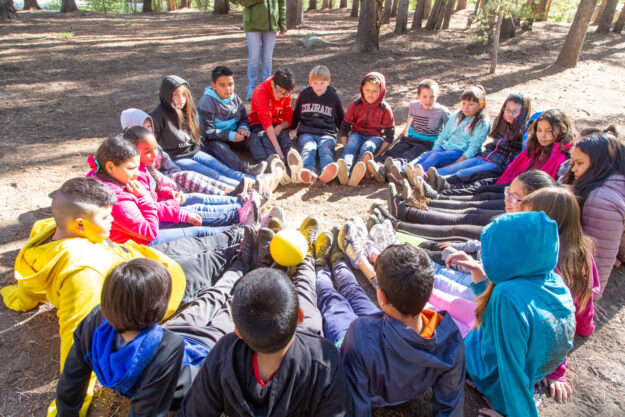Widgetized Section
Go to Admin » Appearance » Widgets » and move Gabfire Widget: Social into that MastheadOverlay zone
Colorado after-school, mental health funds frozen by Trump’s education department

Students at Lake County Intermediate School play outside in early 2020 (courtesy of Lake County School District).
Colorado school districts are scrambling after the Trump administration put on hold $6.8 billion in federal funds for K-12 schools across the country, including an estimated $70 million earmarked for the state.
The U.S. Department of Education is withholding certain grants for after-school programs, teacher training, migrant education and English-language learning, among other initiatives. States were notified Monday, a day before they would typically receive the money.
This pause has left districts across Colorado uncertain about programs they were already committed to offering. Colorado Education Commissioner Susana Córdova sent a letter to schools about the withheld grants, saying she is “deeply concerned about the potential impact of the delay and ongoing uncertainty surrounding these critical funds.”
The federal Department of Education has not provided a timeline on the funds, which it said are under review in a notice to states. The funds were already approved by Congress.
“The Department remains committed to ensuring taxpayer resources are spent in accordance with the President’s priorities and the Department’s statutory responsibilities,” the notice said.
Gov. Jared Polis called the move a “direct attack on children, families and Colorado educators” in a statement Wednesday.
“This funding for our schools is already obligated, and it’s absurd that the federal government withheld it,” Polis said. “Investing in education and ensuring that Colorado children have the best possible future has been a top priority, and it’s disappointing to see the federal government hurt students and teachers.”
Programs in limbo
The paused grants make up two-thirds of the after-school program budget for the Lake County School District, which is nestled in the mountains of central Colorado at a 10,000-foot elevation.
Half of the students enrolled in the small district qualify for subsidized school lunches, and most of their parents drive hours to get to their jobs in high-end resort towns. These parental commutes are why the district’s after-school programs — which provide kids with tutoring, healthy snacks and even occasional bagpipe lessons — are “essential child care,” Superintendent Kate Bartlett said.
Without the federal grants totaling about $400,000 the district expected to receive, Bartlett said most or all of the after-school programming would shut down, forcing some parents to cut hours at work.
“It’s not just losing out on Lego robotics,” Bartlett said. “The downstream impact is actually much deeper. So that is what makes me sad and worried, not just about outcomes for kids, but really outcomes for families and outcomes for our regional economy.”
The Trump administration’s decision has hit other districts across the state hard as well. Denver Public Schools stands to lose at least $10 million if the grants aren’t disbursed, according to district spokesperson Scott Pribble. That could push the district, which is the largest in the state, to make cuts to staffing, programs and services, he said.
Alex Marrero, superintendent of Denver Public Schools, and Carrie Olson, president of the district’s Board of Education, issued a statement on Wednesday afternoon to “demand the immediate release of these funds.”
“This action is not just a logistical crisis — it is a moral and constitutional breach,” the statement said. “The decision to delay the distribution of congressionally-appropriated education funds is a dangerous overreach of executive authority and a direct affront to public education, especially for communities that rely most heavily on these supports.”
Colorado Education Association President Kevin Vick said in a Wednesday interview that the teachers union is seeking “every available avenue” to get the funding restored.
“Most of this funding is earmarked for our most vulnerable students in our most vulnerable districts, and so as these districts are making plans for the upcoming school year, they were relying on these funds to be able to put needed programs in place,” Vick said. “These funds need to be delivered to Colorado as promised.”
School-based mental health care
In a decision earlier this year, the Trump administration canceled about $1 billion in Department of Education grants that focus on addressing student mental health. Those grants come from a different pot of money than the funding paused this week.
On Tuesday, Colorado Attorney General Phil Weiser announced that he was joining 15 other state attorneys general in a lawsuit to restore the mental health grants, calling their cancellation illegal and vague. Nearly $10 million is at stake for Colorado institutions, including the University of Colorado, University of Northern Colorado, University of Denver and Colorado Department of Education.
The funding was meant to “address a shortage of school-based mental health care professionals through recruitment, retraining and re-specializing clinical workers for school-based roles,” according to a statement from Weiser.
“This illegal action by the U.S. Department of Education to rip away critical funding couldn’t be happening at a worse time,” Weiser said. “Colorado is taking action because our educational leaders need every tool possible to support kids who are struggling with disconnectedness, loneliness and isolation.”
The lawsuit was filed Monday in the U.S. District Court for the Western District of Washington in Seattle.
Editor’s note: This story first appeared on Colorado Newsline, which is part of States Newsroom, a nonprofit news network supported by grants and a coalition of donors as a 501c(3) public charity. Colorado Newsline maintains editorial independence. Contact Editor Quentin Young for questions: info@coloradonewsline.com.


